Presented at the Second International Conference of Child Research Network Asia (CRNA) held in Tokyo, Japan, March 17-18, 2018.
Moderator: Yoichi Sakakihara (Director, Child Research Net, Professor Emeritus, Ochanomizu University, Japan)
Results Sharing: Seiko Mochida (Researcher, Child Sciences and Parenting Research Office, BERD, Japan)
Panelists: Takashi Muto (Research Professor, Shiraume Gakuen University Graduate School, Japan), Nianli Zhou (Professor, East China Normal University, China), Sofia Hartati (Dean, Faculty of Education, State University of Jakarta, Indonesia), Junko Takaoka (Research Manager, Child Sciences and Parenting Research Office, BERD, Japan)
Overview of the "International Survey Research on Home Education in Early Childhood" conducted by the Benesse Educational Research and Development Institute
Supportive type of parenting that enhances the development of children's social and emotional skillsMC: In 2017, the Benesse Educational Research and Development Institute ("BERD") conducted the "International Survey Research on Home Education in Early Childhood--Parents in Four Countries" targeting about 4,900 mothers of children aged four to six years in the metropolitan areas of four countries with different sociocultural backgrounds, namely, Japan, China, Indonesia and Finland. Today, we will have a panel discussion based on the survey results. Researchers from these four countries, who worked together with us in this survey, have been invited to take part as panelists.
First of all, Ms. Seiko Mochida, a researcher at the Child Sciences and Parenting Research Office, BERD, will explain the summary of the survey results.
Mochida: In this survey, we examined children in four countries for three skills critical to their development in early childhood, namely, daily habits, attitudes of learning to learn (social and -emotional skills), and cognitive skills (literacy, numeracy, and logical thinking). We also examined mothers' parenting attitudes that support the development of these abilities, the actual conditions of the everyday activities of mothers and children, and mothers' perceptions of parenting and expectations for their child. Please note that the survey was conducted in metropolitan areas and does not represent the actual conditions of the respective countries as a whole.
First, I will explain the distinctive trends in the results of each country based on the following four aspects.
The first aspect is children's daily habits. We asked mothers about their child's daily habits, such as the habit of greeting (social skills), going to the bathroom independently, sleeping, and the habit of tidying up clothes (Figure 1). Looking at the results to the item "can go to bed at the same time every night," a higher percentage of mothers in Japan and Finland answered "very much," which indicates that more children in these two countries seem to have acquired their daily rhythm than those in the remaining countries.
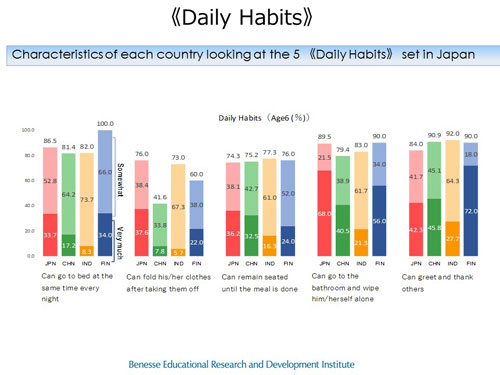
The second aspect is parental involvement in learning at home. Figure 2 shows that mothers in China and Finland are more likely to encourage their child to engage in learning activities using educational toys, and actively provide an environment for further learning if the child expresses his/her interest in letters and numbers. These mothers also seem to be more committed to parent-child activities such as painting and crafting with their child and having them do some household chores.
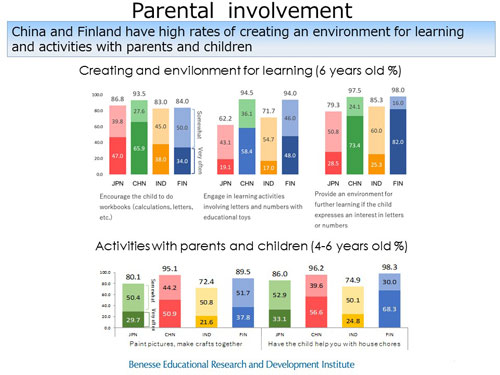
The third aspect is the mothers' perceptions of their child. We asked mothers what their child meant to them. The results show that mothers in all four countries described their child in positive terms, while some differences were still identified by country (Figure 3). For example, more mothers in Finland chose the answer of "Enrichment of my life," while more mothers in China chose the answer of "Individual entity from me." In Indonesia, more mothers chose the answers of "Successor of my ancestor/family," "Follower of my dreams," and "Future caregiver of mine," indicating that Indonesian mothers seem to place their hope in their child for the future. In Japan, more mothers chose the answer of "Connection between my spouse/partner and me," indicating the typical cultural value of Japan where there is an old saying that "Children bind a married couple together." In contrast, fewer mothers in Japan chose the answer of "Person who will play a part in future society" than those of the other three countries. It seems that Japanese mothers are more likely to consider their child as a person of value for their family, rather than a person making a contribution to future society.
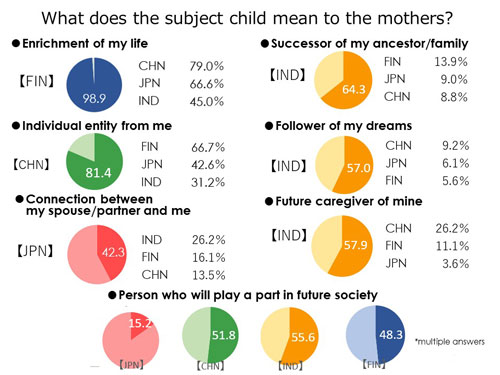
The fourth aspect is the mothers' expectations regarding their child's future personality (Figure 4). The results show that a higher percentage of mothers in all four countries want their child to become "a person caring about his/her own family." By country, more mothers in Japan and China chose the answer of "A person with firm opinions," while mothers in Indonesia tend to choose the answer of "A person with leadership skills" and a higher percentage of mothers in Finland choose the answer of "A person caring about his/her friends." More than 40% of mothers in Japan chose "A person causing no trouble to others," which was distinctive to Japan.
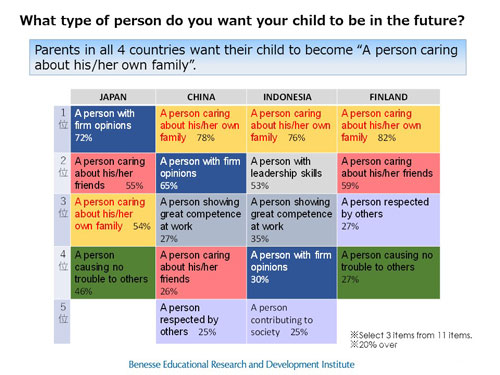
Next, we look into the relationship between the development of social and emotional skills and parental involvement in each country. BERD defines social and emotional skills as the "Attitudes of Learning to Learn," which consist of curiosity, collaborative skills, self-assertion, self-restraint, and perseverance (Figure 5). We use this framework in this survey as well.
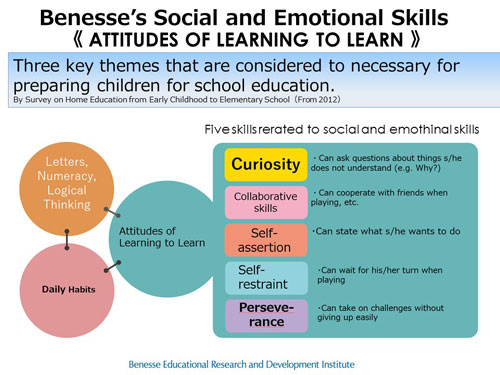
Figure 6 shows the development status of attitudes of learning to learn among children aged six years by country and by skill. The score of curiosity is highest, while the scores of perseverance and self-restraint are lower than that of curiosity in all four countries. This suggests that childishness is common to all countries regardless of cultural background.
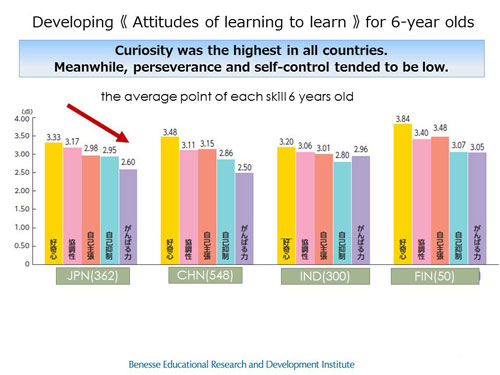
Figure 7 shows the results to the question asked to the mothers what aspects of parenting they value most. The results show that about 80-90% of mothers in all four countries chose the answers of "To encourage the child to care about others," "To let the child express his/her feelings and thoughts," and "To broaden the child's interests," which are all related to the skills defined as "the attitudes of learning to learn" (Figure 7).
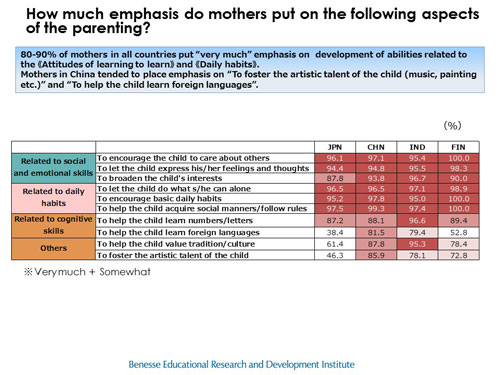
When asking about the mothers' parenting attitudes, we established two categories in this survey: the supportive type and the protective type (Figure 8). The supportive type includes, for example, mothers' attitudes to "Respect and support what the child wants to do" and "Try to understand the child's feelings no matter what the situation is." In contrast, the protective type represents mothers' attitudes to "Get worried that the child cannot do things unless I am around" and "Feel overprotective towards the child." The results show higher scores for the supportive type in all four countries. It should be noted, however, that the scores of two items relating to the protective type in Indonesia are higher than those of the other three countries.
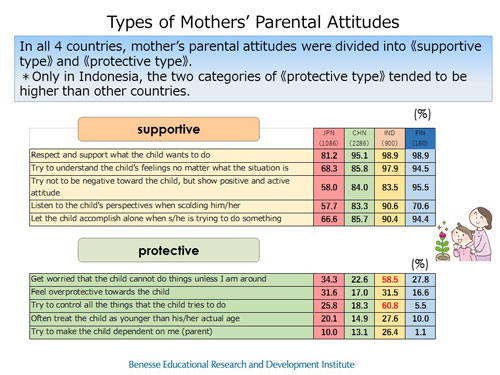
It is considered that the supportive type of parenting has a positive correlation with the development of attitudes of learning to learn of children. For example, the higher the score of the supportive type, the higher the score of curiosity was in all four countries (Figure 9). This indicates that mothers' supportive parenting by supporting the child's feelings and respecting what the children takes interest in enhances the development of children's social and emotional skills.
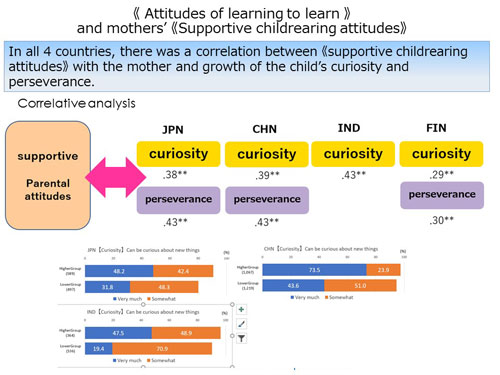
To start this survey, I visited daycare centers, kindergartens, and families in each country and saw mothers with supportive parenting attitudes, respecting the feelings and thoughts of their child. Through my experience in this survey, I reaffirm that warmth and affection expressed by mothers to their child are no different in every society regardless of their language/cultural backgrounds and the living environment. The survey results show a similar tendency in the development of attitudes of learning to learn as well as the state of mothers' supportive parenting in all four countries, which, I believe, supports my recognition.
Child-rearing in Japan
Child-rearing focusing on personal relationships enhances the development of children's social and emotional skillsModerator: Next, panelists from four countries will provide their lectures regarding the actual status and issues of child-rearing in their respective countries.
Muto: I will explain the characteristics of child-rearing in Japan viewed from three aspects based on the results of the above survey.
The first aspect is mothers' perceptions of child-rearing. The results suggest that Japanese mothers are keen to ensure their child's personal relationships with friends and family members, while respecting the feelings and thoughts of their child and valuing their independence. For example, as Ms. Mochida explained, Japanese mothers tend to consider their child as a bond between husband and wife, although they admit the independent status of their child. This indicates that Japanese mothers recognize the existence of their child within a range of family relationships. In addition, Japanese mothers firmly keep the ethical concept of not causing troubles to others, which is probably one of the Japanese traditional values.
The second aspect is the attitudes of learning to learn, consisting of curiosity, collaborative skills, self-assertion, self-restraint, and perseverance. Curiosity scores highest in all four countries. The second highest score differs by country, being "collaborative skills" in Japan. This represents one of the characteristics of child-rearing in Japan, valuing collaborative activities with others from an early age.
The third aspect is mothers' parenting attitudes that relate to the development of attitudes of learning to learn. As Ms. Mochida explained, this survey uses two categories of parenting attitudes, the supportive type and the protective type. The results revealed the facts that more mothers recognize the importance of the supportive type of parenting in all four countries, and that their parenting attitudes are related to the development of children's attitudes of learning to learn. It is also understood that the score of curiosity is higher among children who have more time to play with mothers employing the supportive type of parenting (though, quantitative data is not available here). This suggests that the quality of personal relationships, including parent-child relationships, is critical to the development of attitudes of learning to learn in Japan where child-rearing focusing on personal relationships is highly appreciated.
In contrast, children's cognitive skills such as learning of numbers and letters seem to have a correlation with their learning environments where mothers prepare educational materials and regularly conduct educational play activities with their child, rather than being affected directly by mothers' parenting attitudes. Therefore, such cognitive skills and social and emotional skills (attitudes of learning to learn) take different routes of developments. Nevertheless, I believe there are some links between them, for example, the ability to think.
Intellectual interactions between mothers and children such as asking questions and explaining reasons, which provoke children to think, are considered to have a correlation with the development of attitudes of learning to learn. These interactions may also affect the development of children's ability to think, in a wider sense, which relates to their cognitive skills. In other words, the development of the ability to think can be a link between cognitive skills and social and emotional skills, which can be supported by curiosity and other skills. At the moment, I cannot provide determinative opinions, because it is quite difficult to understand the development process of children's ability to think through questionnaire surveys with parents. I hope to solve this challenging question in future surveys.
Child-rearing in China
Do mothers really respect the feelings and thoughts of their child?Zhou: The results of this survey show that Chinese mothers tend to value children's self-assertion but underestimate the aspect of self-regulation, both of which are part of the attitudes of learning to learn (Figure 10). We conducted the survey targeting mothers with children aged four to six years from three metropolitan areas in China, namely, Shanghai, Beijing, and Chengdu. The analysis results revealed that more mothers value self-assertion than self-regulation (Figure 11).


More than 80% of Chinese mothers answered "Yes" when they were asked whether they respect the feelings and thoughts of their children and encourage their independence. But do they really do so? For example, parents who put their efforts into children's cognitive development from a very early age, to prepare for entrance exams, are not necessarily in a minority. We often see parents still feeding their child at home or carrying the child's belongings while walking on the street of a town, even at the age of four or five years. These parents actually do not seem as though they respect the feelings and thoughts of children nor their independence, which is contradictory to the respondents' answers.
Human behavior is affected by both personal characteristics and psychological environments. Therefore, it is necessary to focus on the group's psychological environment in order to improve the individual's behavior. This is called "Field Theory."
When looking into child-rearing in China from the perspectives of the Field Theory, there are two factors that form the mothers' psychological environment. One is Western culture and the other is China's traditional culture. However, the former factor seems to be merely a superficial adoration for Western culture. I doubt that Chinese mothers understand the true nature of Western culture. This latter factor is rapidly undergoing change due to China's economic development and so on. The issues of these factors seem to generate the issues of child-rearing, such as mothers' focusing only on children's self-assertion, or their conduct not being consistent with their belief of respecting the feelings and independence of their child.
How can such contradictory behavior patterns of mothers positively affect the development of children? The Yangmingism (one of the traditional Chinese philosophies) values "practice what one preaches." I hope to remind Chinese mothers of this Yangmingism, and prompt them to deepen the understanding of western culture as well as to reflect and improve their behavior. To do so, it is necessary to provide them with an appropriate "field," which will be one of the nation's challenges from now on.
Child-rearing in Indonesia
Traditional child-rearing supported by relatives and communitiesModerator: For the survey results in Indonesia, we invited Professor Sofia Hartati, Dean of the Faculty of Education at the State University of Jakarta and Lecturer Eriva Syamsiatin from the same university.
Hartati: We will discuss the overall tendency of child-rearing in Indonesia based on three aspects: children's learning motivation, daily habits and parents' work-life balance.
Regarding children's learning motivation, the results show that most mothers think they should teach their child reading, writing, and numbers at the pre-school stage. However, about 50% of the respondents said they do not give educational toys to their child, and about 20% of the respondents said they do not give picture books to their child. The results also revealed that the majority of children in this survey are using smartphones.
It is also confirmed as part of their cultural background that most mothers are engaged in activities with children enjoying dancing, singing, and playing music. Such activities are considered critical to the development of children's attitudes of learning to learn.
With regards to daily habits, about 60% of mothers have their child get up early and go to bed early. Given that almost 90% of Indonesia's total population is Muslim, the majority of mothers in this survey answered that they get up by 6:30 am with their child and perform the morning prayer together. The mothers' religious devotion is also reflected in children's Islamic education. Mothers have their child read from the Qur'an at an early stage. About 40% of the respondents said their child takes enrichment programs to learn the Qur'an. This suggests that Indonesian mothers are trying to encourage children to engage in the practice of religious devotion so as to enhance the development of attitudes of learning to learn and enrich the children's daily lives.
In addition, there is a tendency among mothers to value outdoor activities or relationships with friends. Furthermore, the majority of mothers let their child do some simple chores such as tidying up toys and washing dishes, which probably enhances the children's life skills.
As for the work-life balance of child-rearing parents, most mothers answered that they place priority on interactions with children, friends, and relatives, rather than their work. Many mothers answered that they receive support with child-rearing from the child's uncles and aunts, grandparents, or neighbors, while ensuring the kids are safe.
Syamsiatin: I will provide one example of child-rearing in a double-income Indonesian family. In this family, parents receive support from their relatives, such as the grandfather visiting and taking care of children every day, and the aunt, who is knowledgeable regarding the Qur'an, helping children's study (Figure 12).
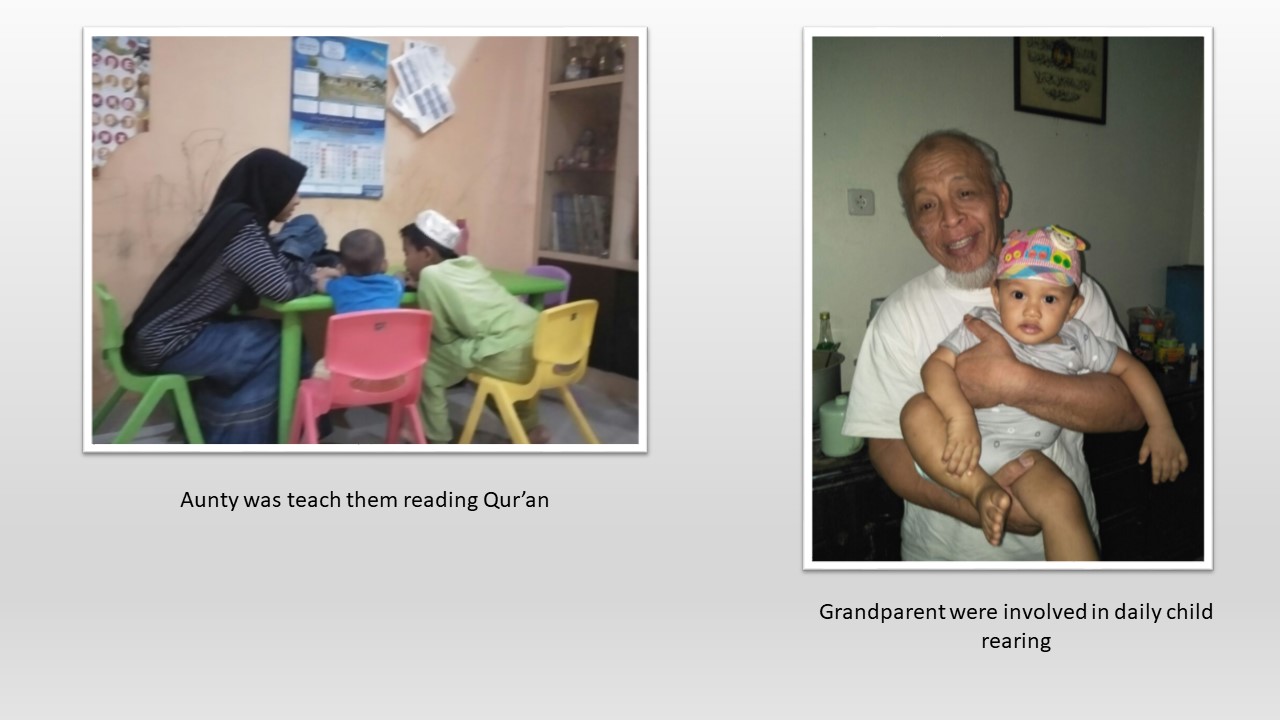
The left photograph in Figure 13 shows them praying, which is considered important for disciplining children. Parents are responsible for religious education and offer prayers with their children whenever they are at home.
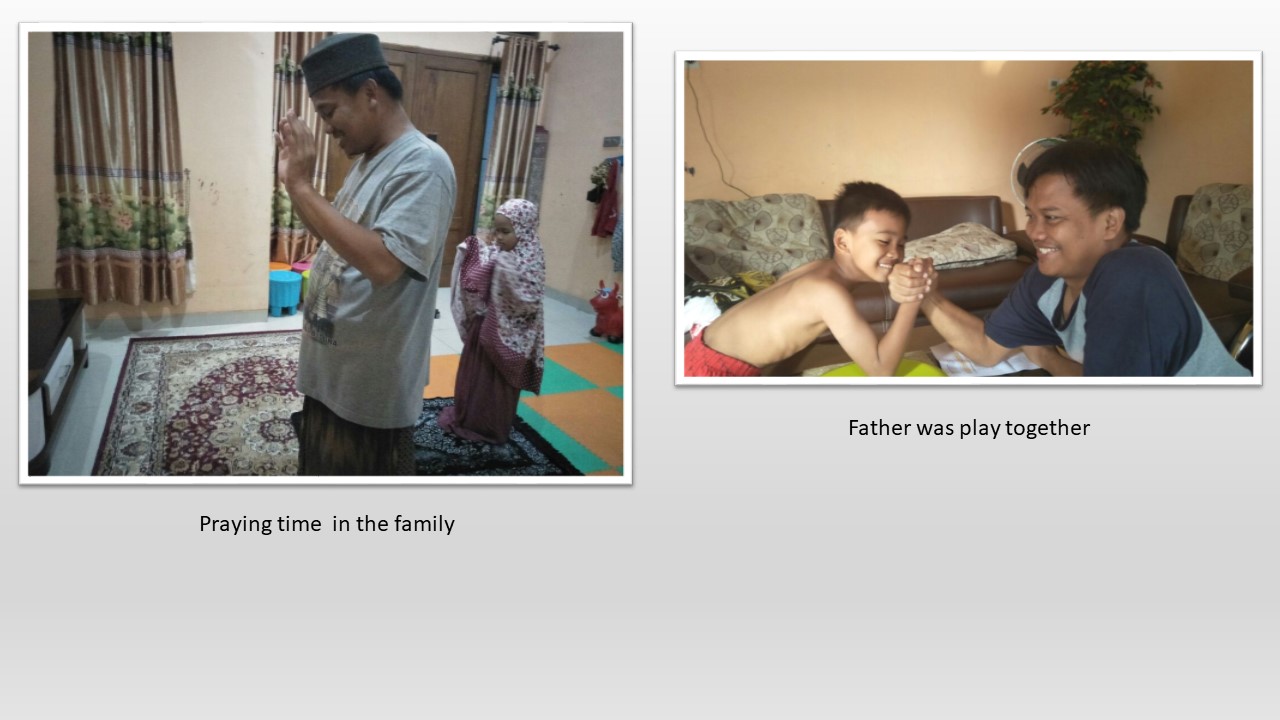
Smartphones are widely used in child-rearing, as Professor Hartati previously mentioned (Figure 14). Parents seem to think that smartphones can respond to the children's curiosity.
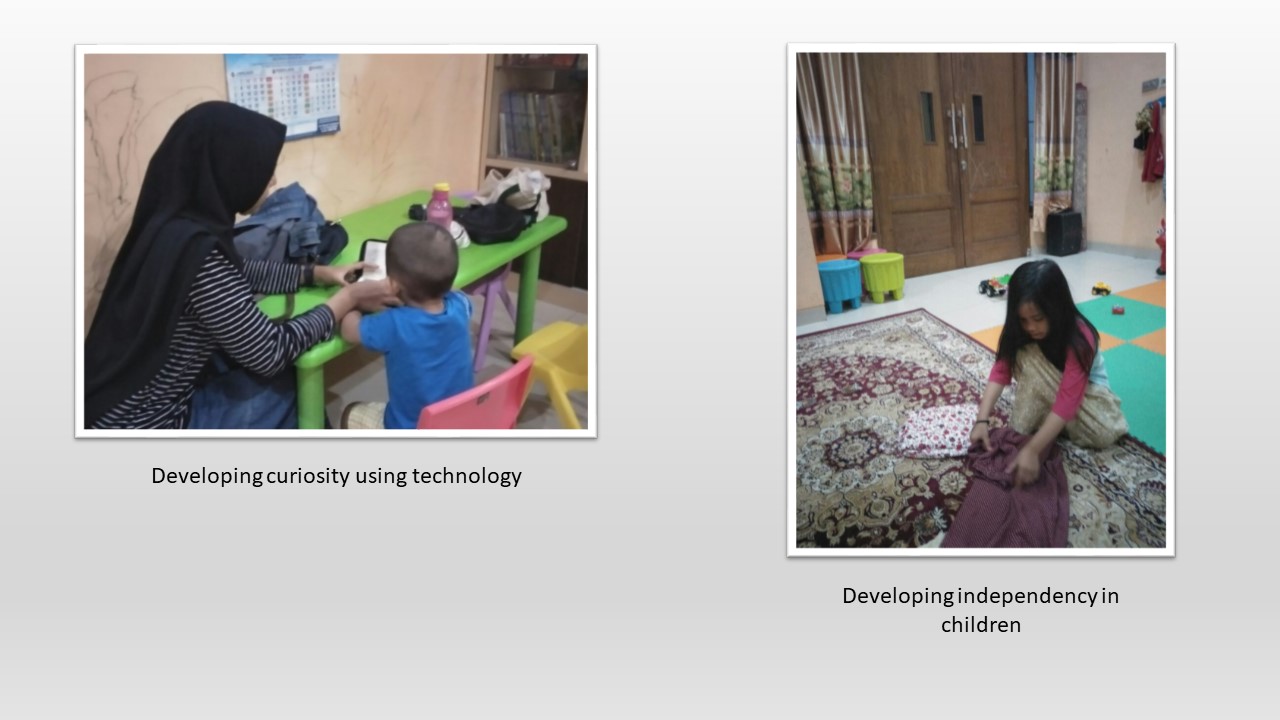
Judging from these circumstances, it seems that child-rearing in Indonesia largely depends on individual efforts. To achieve better child-rearing, it is necessary to strengthen administrative support by, for example, providing families with picture books and other reading books as well as educational materials for young children. In addition, it is necessary to develop specific programs for parents as part of early childhood education services in order to improve their knowledge regarding the development of children's cognitive and non-cognitive skills.
Research studies and surveys on child-rearing are also our challenging tasks for the future, including further study on parents' perceptions of child-rearing. This will help us develop more educational materials for parents. We also need to conduct research on the development of children's attitudes of learning to learn based on the curriculum of preschool and elementary education. In Indonesia, reform of the school curriculum was implemented three years ago; therefore, we need to develop educational materials consistent with the new system.
We hope to preserve the valuable tradition of child-rearing with relatives and communities, and expand this collaborative network into schools and the entire society.
Child-rearing in Finland
Respecting the importance of children's independence as an ideal and giving them freedom in choosing interests and pursuits at homeModerator: Unfortunately, the two collaborators, Professor Risto Hotulainen and Special Advisor Sirku Kupiainen of Helsinki University, are not here today to attend the session; instead they sent us their video message. After watching the video message, Ms. Junko Takaoka, a research manager at the Child Sciences and Parenting Research Office, BERD will share the results.
Takaoka: I will explain five characteristics of child-rearing and parent-child relationships in Finland.
First, the daily rhythm of children is well maintained. Since the majority of mothers work full time and have enrolled their child in a daycare center, the child will have breakfast at the daycare center. Thus, the survey results show how they unconsciously maintain their daily rhythm.
Second, the fathers give a great deal of daily support in child-rearing. In Finland, working hours start early, thus mothers and fathers come home early (80% of fathers come home between 4pm-6pm; 50% of mothers between 4pm-5pm). Therefore, a high percentage of fathers participate in daily housework and child-rearing activities at home.
Third is regarding home education. In Finland, parents focus on the children's interests at home. Some parents teach their child how to read and write at home through writing letters or playing with numbers, but basically take in consideration what the child shows interest in. As a result, about one-third of children have acquired the ability to read at the time of their entrance into elementary schools, without receiving preliminary preparation.
Fourth, is the popularization of digital devices at home and the high percentage of taking enrichment lessons and programs. The results show that about 46% of the surveyed children use tablets more than three days a week, which is more frequent than the other countries (approx. 15% in Japan). In addition, about 78% of the children take part in enrichment lessons and programs such as sports and music activities, also accounting a higher percentage than Japan (approx. 68%).
Fifth, is the parents' perceptions of child-rearing. The results show that mothers place great emphasis on nurturing children's attitudes of learning to learn, and building cooperative relationships with peers. For the question "How much emphasis do you put on the following aspects of parenting?", about 73% of mothers chose the answer of "To let the child interact with parents" (approx. 30% in Japan). On the other hand, about 66% of mothers chose the answer of "The child should make own decisions and judgements about education and parents should respect this," indicating that parents are positively supporting the independence and personal growth of their child (also high in Japan resulting in approx. 70%). For parenting attitudes, the majority of mothers chose the supportive type and very few mothers chose the protective type.
Furthermore, about 83% of mothers chose the answer of "Parenting is important but so is my own life." This rate is highest among all four countries (approx. 57% in Japan), suggesting that Finnish mothers are trying to take on dual roles of being a mother and an adult in their lives.
Open discussion
Multidirectional discussion regarding social and emotional skills (attitudes of learning to learn)Sakakihara: Now, we start an open discussion with the panelists and the audience based on the lectures provided.
Questioner A: I am from the State University of Jakarta, Indonesia. Why do you call social and emotional skills as the attitudes of learning to learn?
Muto: Social and emotional skills are often called non-cognitive skills internationally. Since the 2000s, social and emotional skills have been the focus of worldwide attention after it was proved that, not only cognitive skills, but also social and emotional skills are necessary for the assessment of children's academic achievements and other abilities such as adaptability in a group setting.
In Japan, people traditionally value the social and emotional skills of children. In the past ten years, the Japanese government has been seeking new approaches for daycare centers and kindergartens while adopting international developments, and establishes new educational policies and curriculums focusing on the attitudes of learning to learn that can be nurtured based on social and emotional skills together with knowledge and the ability to think.
As Ms. Mochida explained previously, the attitudes of learning to learn consist of curiosity, collaborative skills, self-assertion, self-restraint, and perseverance. These are affected by emotions and personal relationships. For example, to achieve your self-set goal, you need to have both cognitive skills and a strong incentive, one of the non-cognitive skills. We named such non-cognitive skills as the attitudes of learning to learn with the hope that children can enjoy learning while developing these skills in their early childhood.
Questioner B: The term "self-assertion" includes broad concepts. I think it would be better to use the term "self-expression." What do you think?
Muto: We use the term "self-assertion" in a comprehensive sense. We provided specific answers such as "Can state what s/he wants to do," "Can ask adults what s/he wants or wants them to do," "Can say 'No' to friends when they do something unfavorable" and "Can insist his/her opinion when it is different from his/her friends" which are related to both self-assertion and self-expression.
Questioner C: I am a pediatrician working at a clinic in Malaysia. In Malaysia, grandparents are deeply involved in child-rearing and often influence children more than their mother. Therefore, it is not an exaggeration to say that grandparents will determine the children's education and its outcome. Do you have any data regarding the involvement of grandparents in child-rearing in the four countries?
Mochida: When we asked the mothers, who looks after their child apart from the mothers allowing multiple answers, "Grandparents" was the top answer in China, while over 60% answered "Grandparents" in the other three countries as well. Other than "Grandparents," "Neighbors" in Indonesia, "Temporary daycare or child care in a kindergarten" in Japan gained higher percentages of responses than the other countries.
Questioner D: I am from the Child Development Research Center, Sultan Idris Education University in Malaysia. Professor Zhou mentioned the influence of Western culture on child-rearing. Do you think we can see such an influence in other Asian countries?
Hartati: Recently in Indonesia, parents of higher social classes living in metropolitan areas tend to enroll their child in daycare centers. This is probably due to the influence of Western culture. In contrast, parents from lower social classes or those living in rural areas maintain traditional child-rearing with the support of relatives and neighbors, rather than putting their child in a daycare center.
Muto: In Japan, traditional child-rearing is less popular, but not necessarily due to the influence of Western culture.
This survey was conducted in the metropolitan areas of four countries. In Japan, the trend toward the nuclear family is accelerating in Tokyo and other metropolitan areas and the rate of grandparents living together is declining. Therefore, parents do get support from grandparents, but not every day. This reduces the opportunity of getting advice from grandparents. Meanwhile, mothers in their 20s and 30s tend to get various items of information on child-rearing through their friends and the Internet. Under these circumstances, traditional Japanese child-rearing is gradually changing. We assume that this change will continue into the foreseeable future.
Questioner E: I am a former professor at Jumonji University. I have a question relating to the lecture of Professor Zhou as well. In China, Professor Zhou mentioned that there might be a discrepancy between the answers of mothers and their actual behavior. When looking into the results of previous child-rearing surveys, I think there is also a tendency in Japan where the respondents provide superficial answers by separating their public and private selves, or the kind of answers which they think they are expected to provide. Did you verify the consistency between their answers and actual behavior in this survey?
Takaoka: We did not set checking items to verify such a discrepancy in this survey. However, we are currently working to identify the existence of such a discrepancy, if any, and its degree and appropriateness through consultation with our editorial supervisors of each country.
Sakakihara: I am working as an advisor in this survey. I fully understand that there is a discrepancy between the respondents' answers and their actual behavior. It is necessary for us to conduct a field study and observe and confirm the actual conditions of respondents by ourselves. We plan to conduct such a survey in the future.
Questioner F: According to the current trend where more children are attending daycare centers, I think that the involvement of childcare workers as the second parents is important for the development of children's social and emotional skills. Is there any possibility that the results of this survey may be used for curriculum preparations and training for childcare workers?
Muto: The courses of study for kindergartens and the childcare policies for childcare facilities published by the Japanese government stipulate the attitudes of learning to learn. However, the details have not been confirmed. I hope that the results of this survey will contribute to the practice of kindergarten teachers and childcare workers.
Questioner A: I would like to pose a question. I believe that both cognitive and non-cognitive skills are necessary for the development of children. What kind of programs, do you think, are necessary to cultivate these skills effectively?
Sakakihara: It is difficult for us to show specific programs at the moment. But I can say, at least, that play largely affects the development of these skills.
This panel discussion was very interactive and fruitful, teaching us various new ideas. Now, this discussion is drawing to a close. I sincerely thank all of you for participating in the conference.



 Yoichi Sakakihara
Yoichi Sakakihara Seiko Mochida
Seiko Mochida Takashi Muto
Takashi Muto Nianli Zhou
Nianli Zhou Sofia Hartati
Sofia Hartati Eriva Syamsiatin
Eriva Syamsiatin Junko Takaoka
Junko Takaoka










